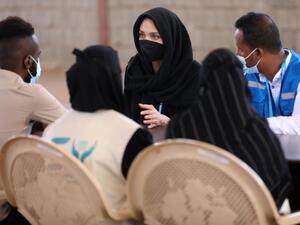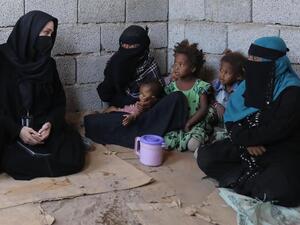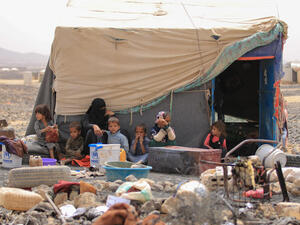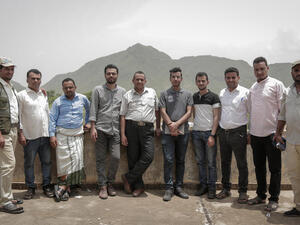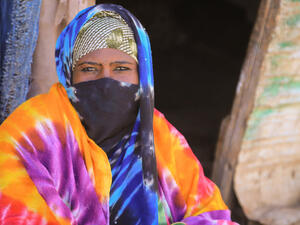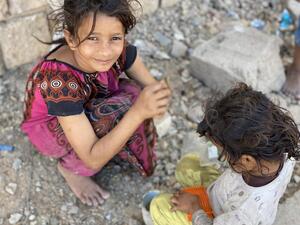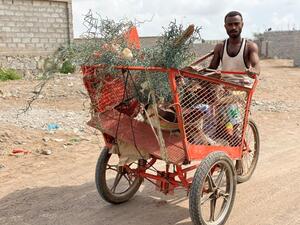Rapid assessments in Yemen find desperate situation for displaced civilians
Rapid assessments in Yemen find desperate situation for displaced civilians

A truckload full of UNHCR aid in Yemen.
GENEVA, May 19 (UNHCR) - The UN refugee agency was able to fly in six planeloads of aid to Sana'a and deliver aid stocks by road to Aden during a just-ended five-day truce in Yemen, but rapid assessment teams found enormous difficulties for thousands of civilians displaced by weeks of conflict.
The temporary pause in hostilities officially ended on Sunday night and came following weeks of fighting since late March that uprooted some 545,000 people.
"It [the truce] nonetheless allowed UNHCR to fly in more aid, transport supplies from ports to distribution hubs in Sana'a and Aden, and preposition and distribute aid to displaced people in previously hard-to-reach areas," UNHCR spokesman Adrian Edwards told journalists in Geneva.
"All six of our planes bringing aid from Dubai were able to land safely in [the capital] Sana'a. Ten trucks moving aid from Sana'a to Aden eventually got through - although the journey took three days instead of one due to delays at checkpoints and localized fighting," Edwards said, adding: "In-country stocks of relief items are now three times higher than they were before the pause."
The fighting since March has displaced an estimated 545,000 people. The ceasefire in Yemen enabled UNHCR and its partners to conduct rapid protection assessments in 40 districts across 11 previously difficult to access governorates - Sana'a, Amant Al-Asimah, Abyan, Lahj, Mareb, Shabwa, Hajjah, Taizz, Amran, Aden and Al-Dhale. "Teams found traumatized populations - afraid, upset and struggling to meet basic needs," Edwards said.
In the Amant Al-Asemah area of Sana'a, UNHCR interviewed displaced people staying with host families. Several households now crowd under a single roof, without adequate bathrooms or water supply. Fuel shortages make it difficult to pump water, even where wells exist. Many of the people in this area were economically vulnerable before the crisis, and are even worse off now.
Most have lost their livelihoods and are entirely dependent on aid. The soaring prices for food, fuel and bottled or trucked water compound the difficulties. With the situation dragging on, many displaced people hosted by others are concerned to find their own shelters.
"Checkpoints, insecurity and high transport prices make it difficult to move about. Access to basic health care is too far away for many, and transport too expensive. Scores of children were found to be malnourished, while the accumulation of garbage makes crowded situations worse, raising fears that disease will spread," Edwards told the journalists in Geneva.
He added that in Aden, UNHCR teams met a couple and their seven children, the youngest just one month old, staying in a secondary school with another 53 families. They fled their home in the Dar Saad district of Aden two weeks ago and ran 12 kilometres on foot until finding shelter in one of the many public buildings hosting families in the Sheikh Othman district of Aden. The family shares a room with no electricity or running water, and sleeps on a salvaged plastic advertising banner that had fallen onto the street during recent shelling.
"Our partner in Sa'ada says normal life has almost ground to a standstill, with no electricity, no internet or landlines. Ninety-five per cent of shops are closed, and only one restaurant is open in the whole city. Water is scarce and there is very little movement because of the shortages of fuel," Edwards said.
The remaining inhabitants, mostly men guarding their property, remain indoors. There is widescale destruction of government buildings and shops situated near traffic junctions, including some buildings in old Sa'ada.

